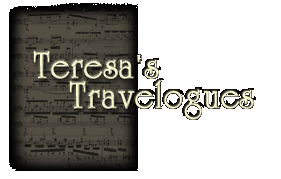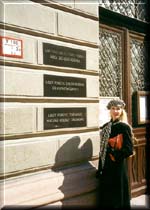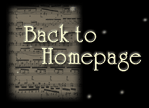|
Letter
From Budapest Dear Readers, I am at the halfway stage in my Hungarian tour. Everything is going extremely well, and I have promised my husband Jeff that I will take today off. Tonight we are scheduled to attend the ballet at the Hungarian State Opera House (Sheherezade, one of my favorites!). I am drinking strong Hungarian cappuccino in the coffee shop of the elegant Gellert Hotel in Buda, overlooking the Duna (Danube) River. There has been a hotel here since the time of the Roman Empire, primarily because of the mineral springs on this site, famous for its therapeutic baths. Jeff is trying out the baths for an hour or two, so this is an ideal time for me to write to all of you. I have not performed in Eastern Europe since the decline of Communism, and this is my first trip to Hungary. It is a profound musical pilgrimage for me to perform in the country of Liszt's birth. The flight from Newark to Munich seemed relatively short compared to my 23-hour flight to Sydney, Australia, last November. For both trips, I explained to the airlines that I am a concert pianist with recitals soon after my arrival. Both Quantas and Lufthansa gave me an entire row of seats so that I could sleep during the night flights. I am grateful, because jet lag is always a factor for international performances, and I am playing a very physically demanding program. When we arrived, the Budapest Sun had just printed a feature article about my trip. My first recitals were presented at the Franz Liszt Academy of Music and Liszt Memorial Museum. I am performing an all-Liszt program featuring his little-known sacred piano works before intermission and concluding afterward with the massive Sonata in B Minor. To perform these works at the Music Academy Liszt himself founded fills me with incredibly intense emotions. I imagined to myself as I played my dress rehearsal that Liszt and I were alone in the empty hall with the music we both love as the bond between us. When I looked up at the conclusion of the B-minor, one of the empty chairs was bathed in sunlight. The pianos here are not what I expected. I had been told that I should expect them to have a very stiff action, and the contrary is true, at least regarding the three I have played thus far. In my recitals here I have played a couple of the new Hamburg Steinways with a very bright tone and almost a fortepiano touch. The third piano (for my recital last night) was an ancient German-built 9-foot Steinway with a serial number from the stone age. Liszt's pianos are on display in the Liszt Museum but of course are not used for concerts. His three pianos are the most valuable items in the Liszt Museum of the Academy. Two Chickering pianos were presented to Liszt by the American firm founded in Boston which proved to be Steinway's only real rival during the 1870's and 1880's. Chickering was awarded the Gold Medal at the 1867 World's Fair in Paris and presented Liszt with the prize-winning piano. The third piano is a massive Bösendorfer, which Liszt played most frequently in his later years. This is probably the piano he used when composing his late works, especially the sacred piano works I am performing here. It is an inspiration for me to see his pianos and to imagine the master virtuoso bringing these very keys to life. I am extremely moved at viewing many of the items in the Liszt Museum. The originals of many of the portraits and photographs of Liszt are on display here, as well as an assortment of personal items: furniture, clothing, the hat he wore as an abbé, his prayer book, crucifix, prie-dieu, the ecclesiastical certificate announcing his minor holy orders, a lock of his hair, a bronze replica of his right hand. Jeff observed that the size and shape of his right hand and fingers resembles my own. The Hungarian Embassy was very helpful in teaching me a few rudimentary phrases of Hungarian. I am grateful because English is not widely spoken or understood here. For some of my recitals, an interpreter is present translating my remarks on the music phrase by phrase. For my recital at the Museum, I did not speak at all until the reception afterward. One of the Liszt scholars working here actually introduced each of the pieces before I walked out and played it. She explained to me that most of the audience would not understand English, so she had prepared scholarly remarks on each work which she presented in Hungarian. Waiting backstage, I had no idea what she said, but I am confident that it was well done. This is, after all, the home of Liszt scholarship, with the Neue Liszt-Ausgabe (The New Liszt Edition) still in progress. It has taken a certain amount of real courage for me, as an American, to perform all-Liszt programs in the country of his birth. Standing backstage before the first concert, this phrase crept into my mind: "What was I thinking when I accepted invitations to play on this musically hallowed ground?" This is proving to be an invaluable personal and professional pilgrimage. Audiences have been wonderfully responsive and receptive, calling me back onstage after every set of pieces and bursting into the dressing rooms afterward before I even have time to catch my breath. Then, too, after Saturday's concert my hosts from the Hungarian Liszt Society and the directors of the Liszt Center invited me to a meeting to discuss return engagements. At the meeting yesterday, they presented me with their idea that I return in October 2000 to play a centennial gala recital in honor of Liszt's birthday. I was extremely honored by this invitation to become the first American to present the annual recital commemorating Liszt's birth. They want me to play another all-Liszt program and request that I include the three hymns from this program. These sacred piano works are not well known in Hungary. During the final stage of Liszt's life, he divided his time between three locations - "une vie trifurquée". He spent part of each year in Rome, in Weimar, and in Budapest. One of my concerts was held in the Recital Hall built into Liszt's permanent residence in Budapest. The concert stage was constructed so that Liszt could walk directly onstage from his bedroom-study. At the close of my recital, I experienced a "mystical moment" that I shall never forget. As I came to the end of the Liszt Sonata, I sensed a vast, warm and glowing presence emanating through the back of the concert hall. It kept glowing and filling space until it encompassed the atmosphere of the entire back wall like one joyful and benevolent benediction. I learned afterward that during the restoration of this concert hall, the stage platform was moved to its present location because of the increase in outside traffic. During Liszt's time, the concert platform was located in what is now the back of the hall. No matter how many times I may return to Hungary in future years, I know that this first visit will always have a special place in my heart. Hungarians are wonderful people with a great sense of humor and an intense national pride. At one of my receptions, some concert-goers told me that all those who love Hungarians will go to heaven. Someone else quipped, "Why do those who love Hungarians go to heaven?" Answer: "Because it takes an Eternity to learn to speak Hungarian!" My awareness of twentieth-century history has become much more vivid. This is a poor country with a turbulent history. The stories of religious persecutions have been particularly gruesome. From our apartment in the Protestant Guest House, we can see the bridge from which Jews were executed, their bodies left to decay in the river below. Nor were Catholics and Protestants exempt from such atrocities. At one point, Lutherans were hunted down, along with anyone of German descent. At another time, anyone of with a Masters Degree or higher was executed. Through all the tragedy and turmoil, the music of Liszt survived and spoke to this nation and to the world. When I say to my audiences that music is a universal and eternal language, and "For Heights and Depths No Words Can Reach, Music Is the Soul's Own Speech", I will forever hereafter retain a vision of Liszt's homeland. |



